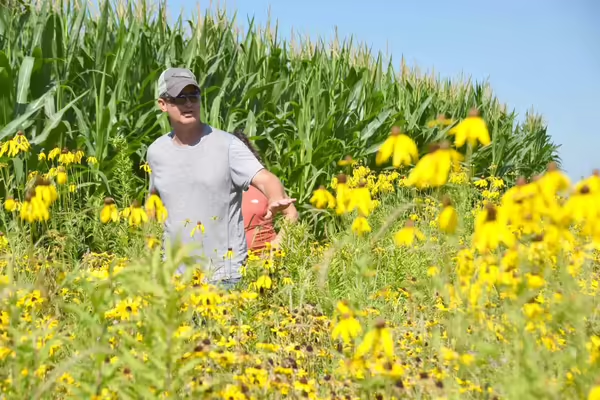
LEWISTOWN, Ill. - Commercial row-crop agriculture and environmental conservation are not mutually exclusive. While large-scale farming operations can sometimes have negative environmental impacts, many farmers are increasingly adopting sustainable practices that promote biodiversity and ecosystem health.
McDonough County farmer and University of Illinois Extension Master Naturalist Brent Fowler is leading the charge.
“Overhearing my dad talk about quail hunting, no longer possible due to their population decline, really struck a chord with me. I set out to change that,” explained Fowler. “Most of my stewardship activities involve prairie and field-to-forest border edges. I care for about 160 acres of prairie in about 30 small fields. Most of these prairie acres have been planted along field edges where the forest transitions to row crops—this creates excellent habitat and can actually be more profitable for the farm because row crops don’t yield well right up next to large trees.”
Not satisfied with simply making conservation-minded improvements on his land, Fowler is actively educating others about his efforts. After becoming a Master Naturalist in the Fulton-Mason-Peoria-Tazewell Unit in 2022, Fowler began hosting farm tours. He shows visitors the various strategies he employs seasonally, including establishing spring/summer blooming prairie plants, identifying fall colors of native shrubs, and how best to control invasive species.
“Touring Brent’s farm during the 2024 state Extension Master Naturalist conference inspired me not only to continue to plant native species for pollinators, but to be aware of the various bird species that need native prairie for habitat. His passion for conservation was contagious!” explained Extension Master Gardener and Master Naturalist Janine Donahue.
In addition to the work on habitat restoration, Fowler is also incorporating regenerative agriculture practices in his row-crop acreage, including reduced tillage and cover crops, These practices work in tandem to reduce soil erosion and prevent nutrient loss in our streams and rivers.
“Ten years ago, when we were slowly and cautiously transitioning to no-till, each step involved yield test after yield test to prove that what we were doing was more profitable or at least as profitable. We are now almost exclusively no-till on our 3,500 acres of corn and soybeans with about half of that receiving a cover crop.”
“Conservation farming is crucial for the long-term sustainability of our food production systems,” explained Tara Heath, commercial agriculture educator. “I'm excited to see him leading the way in implementing practices that benefit both the environment and the agricultural community."
Photo caption (photo by Anita Wilkinson)
Local Extension Master Naturalist Brent Fowler led a conservation farm tour during the 2024 Illinois Master Naturalist Conference highlighting his efforts to fight invasive species, promote biodiversity, and improve wildlife habitat on his McDonough County farm. Fowler is using his passion for environmental conservation along with his expertise in commercial agriculture to educate others about the environmental and financial benefits of conservation farming.
University of Illinois Extension develops educational programs, extends knowledge, and builds partnerships to support people, communities, and their environments as part of the state's land-grant institution. Extension serves as the leading public outreach effort for University of Illinois Urbana-Champaign and the College of Agricultural, Consumer and Environmental Sciences in all 102 Illinois counties through a network of 27 multi-county units and over 700 staff statewide. Extension’s mission is responsive to eight strategic priorities — community, economy, environment, food and agriculture, health, partnerships, technology and discovery, and workforce excellence — that are served through six program areas — 4-H youth development, agriculture and agribusiness, community and economic development, family and consumer science, integrated health disparities, and natural resources, environment, and energy.